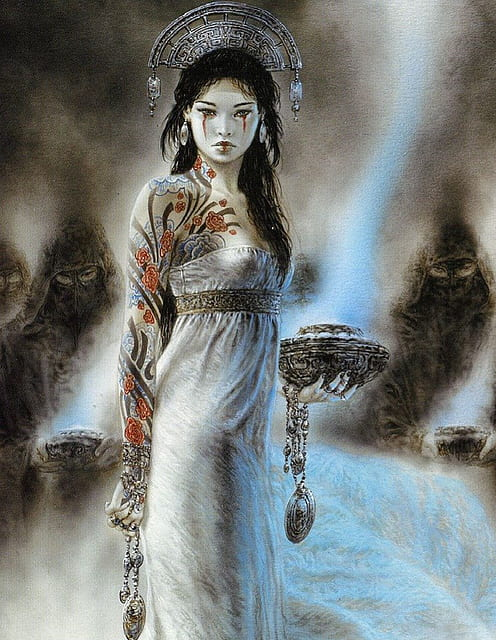Wu Zetian
Methuselah
Overview
Wu Zhao, commonly known as Wu Zetian, alternatively Wu Hou, and during the later Tang dynasty as Tian Hou, was the de facto ruler of the Tang dynasty, as an empress consort, first through her husband Emperor Gaozong and then as an empress dowager, through her sons Emperors Zhongzong and Ruizong, from 665 to 690, not unprecedented in Chinese history. She subsequently became empress regnant of the Wu Zhou dynasty of China, ruling from 690 to 705, unprecedented in Chinese history. She was the only legitimate female sovereign in the history of China. Under her 40-year reign, China grew larger, corruption in the court was reduced, its culture and economy were revitalized, and it was recognized as one of the great powers of the world.
Wu was the concubine of Emperor Taizong. After his death, she married his successor—his ninth son, Emperor Gaozong, officially becoming Gaozong's huanghou, or empress consort, the highest ranking of all the wives, in 655, although having considerable political power prior to her empress title, and then as empress began to control the court. After Gaozong's debilitating stroke in 660, Wu Zetian became administrator of the court, a position equal to the emperor's, until 705.
After re-entering the Emperor Gaozong's harem, she clashed with Empress Wang and Consort Xiao to gain the emperor's affection, and eventually expelled and killed them. After her wedding to Gaozong in 655, Empress Wu's rise to power was swift. A strong, charismatic, cunning, vengeful, ambitious and well-educated woman who enjoyed the absolute interest of her husband, Wu was the most powerful and influential woman at court during a period when the Tang Empire was at the peak of its glory. She was more decisive and proactive than her husband, and she is considered by historians to have been the real power behind the throne during the reign of Emperor Gaozong for more than twenty years until his death. She was partially in control of power since November 660, and then totally since January 665. History records that: "She was at the helm of the country for long years, her power is no different from that of the emperor," Empress Wu presided over the court with the emperor, and even held court independently when the Emperor was unwell. She was given charge of the Heirloom Seal of the Realm, implying that her perusal and consent were necessary before any document or order received legal validity. Gaozong sought her views on all matters before issuing orders. In the last years of his reign until death, Emperor Gaozong was unable to run the state due to illness, so he delegated his responsibilities to Empress Wu. Wu was granted certain honors and privileges which were not enjoyed by any Chinese empresses before or after. After Gaozong's death, Empress Wu as empress dowager and regent conquered power completely and solely, used absolute power more forcefully and violently than before, and suppressed her overt and covert opponents, and seven years later, she seized the throne in the Zhou dynasty, becoming the only empress regnant in Chinese history. Wu Zetian is depicted in the Wu Shuang Pu by Jin Guliang.
Empress Wu is considered one of the greatest emperors in Chinese history due to her strong leadership and effective governance, which made China one of the most powerful nations in the world. The importance to history of Wu Zetian's period of political and military leadership includes the major expansion of the Chinese empire, extending it far beyond its previous territorial limits, deep into Central Asia, and engaging in a series of wars on the Korean Peninsula, first allying with Silla against Goguryeo, and then against Silla over the occupation of former Goguryeo territory. Within China, besides the more direct consequences of her struggle to gain and maintain supreme power, Wu's leadership resulted in important effects regarding social class in Chinese society and in relation to state support for Taoism, Buddhism, education, and literature. She set up spies to build a strong intelligence system in the court and throughout the empire to deliver daily reports on current affairs of the empire or opposition to the central state. She also played a key role in reforming the imperial examination system and encouraging capable officials to work in governance to maintain a peaceful and well-governed state. Wu Zetian also had a monumental impact upon the statuary of the Longmen Grottoes and the "Wordless Stele" at the Qianling Mausoleum, as well as the construction of some major buildings and bronze castings that no longer survive.
Besides her career as a political leader, Wu Zetian also had an active family life. Wu was a mother of four sons, three of whom also carried the title of emperor, although one held that title only as a posthumous honor. One of her grandsons became the renowned Emperor Xuanzong of Tang.
Welcome to our World of Darkness tabletop world.
To gain full use of the site you will need to LOGIN to world anvil and come back to this page.
once you are logged in you will be able to select a species in the right nav


Comments